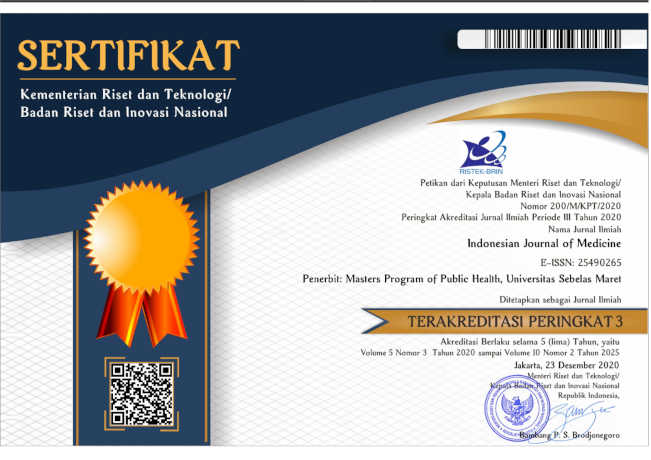Association Between Parental Education, Occupation, Income, Language Activity, and Language Proficiency in Children
DOI:
https://doi.org/10.26911/theijmed.2016.1.3.25Abstract
Background: Language proficiency should be mastered by children before school admision. The process of language development was affected by cognitive and neurologic maturity. Language proficiency determine communication foundation, social and academic interaction. Children with retardation in language proficiency may encounter problem in the social and academic relationship. This study investigated the association between parental education, occupation, income, language activity, and language proficiency in children.
Subjects and Method: This was an analytic observational study with cross sectional design. This study was conducted in Gondangrejo sub-district, Karanganyar, Central Java. A total sample of 102 children aged 4 to 5 years were selected for this study. The dependent variable was language proficiency. The independent variables were parental education, occupation, income, and language activity. The data were collected by a set of questionnaire and analyzed by multiple logistic regression.
Results: Parental education ≥ senior high school (OR= 2.95; 95% CI= 1.03 to 8.39; p= 0.043), employed parents (OR= 3.45; 95% CI= 1.27 to 9.39; p= 0.015), family income ≥ regional minimum wage (OR= 6.35; 95% CI= 2.02 to 19.93; p= 0.002), and intense language activity (OR= 4.32; 95% CI= 1.61 to 11.51; p= 0.003) were associated with better language proficiency.
Conclusion: Parental education ≥ senior high school, employed parents, family income ≥ regional minimum wage, and intense language activity are associated with better language proficiency.
Keywords: parental education, occupation, language activity, language proficiency, children
Correspondence: Hafidz Triantoro Aji Pratomo. School of Health Polytechnics, Poltekkes Surakarta. Email: hafidzpoltekkes@gmail.com
Indonesian Journal of Medicine (2016), 1(3): 152-159
https://doi.org/10.26911/theijmed.2016.01.03.02
References
Badan Pusat Statistik Karanganyar (2013). Karanganyar dalam angka 2013. http://www.karanganyarkab.go.id/. Diakses pada tanggal 02 Februari 2015.
Bennett KK, Weigel DJ, Martin SS (2002). Children’s acquisition of early literacy skills: examining family contributions, Early Childhood Research Quarterly 17: 295–317.
Botting N, Contiramsden G (2000). Social and behavioural difficulties in children with language impairment. Child Language Teaching and Therapy 16 (2): 105-120.
Dollaghan CA, Campbell TF, Paradise JL, Feldman HM, Janosky JE, Pitcairn DN (1999). Maternal education and measures of early speech and language. Journal of Speech, Language, and Hearing Research 42: 1432–1443.
Hackman DA, Farah MJ (2008). Socio economic status and the developing brain. Trends in Cognitive Sciences. 13(2): 65-73.
Harrison LJ, McLeod S (2010). Risk and Protective Factors Associated With Speech and Language Impairment in a Nationally Representative Sample of 4 to 5 Year Old Children. Journal of Speech, Language, and Hearing Research 53(2): 508-529.
King TM, Rosenberg LA, Fuddy L, McFarlane E, Sia C, Duggan AK (2005). Prevalence and early identification of language delays among at risk three year olds. Journal of Developmental and Behavioral Pediatrics 26: 293.
Li J, Powdthavee N (2014). Does more education lead to better health habits? Evidence from the school reforms in Australia. Social Science and Medicine 30: 1–9.
Mc Leod S, Harrison LJ (2009). Epidemiology of Speech and Language Impairment in a Nationally Representative Sample of 4 to 5 year old children. Journal of Speech, Language, Hearing Research 52: 1213–1230.
Miser TM, Hupp JM (2012). The Influence of Socioeconomic Status, Home Environment, and Childcare on Child Language Abilities. Current Psychology 31(2): 144–159.
Perkins WH, Kent RD (1986). Functional Anatomy of Speech Language, and Hearing: A Primer. Boston: Allyn and Bacon
Snow CE, Burns MS, Griffin P (1998). Preventing reading difficulties in young children: Committee on the Prevention of Reading Difficulties in Young Children, National Research Council dalam Weigel, 2007. Language development in the years before school: a comparison of developmental assets in home and child care settings. Early Child Development and Care.
Thatcher KL, Fletcher K, Decker B (2008). Communication disorders in the school: Perspectives on academic and social success an introduction. Psychology in the Schools 45(7): 579–581.
Weigel DJ, Lowman JL, Martin SS (2007). Language development in the years before school: a comparison of developmental assets in home and child care settings. Early Child Development and Care 177(6-7): 719–734.











